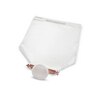Amine oxidase copper-containing 1 (AOC1) is a downstream target gene of the Wilms tumor protein, WT1, during kidney development.
Kirschner, KM; Braun, JF; Jacobi, CL; Rudigier, LJ; Persson, AB; Scholz, H
The Journal of biological chemistry
289
24452-62
2014
Zobrazit abstrakt
Amine oxidase copper-containing 1 (AOC1; formerly known as amiloride-binding protein 1) is a secreted glycoprotein that catalyzes the degradation of putrescine and histamine. Polyamines and their diamine precursor putrescine are ubiquitous to all organisms and fulfill pivotal functions in cell growth and proliferation. Despite the importance of AOC1 in regulating polyamine breakdown, very little is known about the molecular mechanisms that control its expression. We report here that the Wilms tumor protein, WT1, which is necessary for normal kidney development, activates transcription of the AOC1 gene. Expression of a firefly luciferase reporter under control of the proximal AOC1 promoter was significantly enhanced by co-transfection of a WT1 expression construct. Binding of WT1 protein to a cis-regulatory element in the AOC1 promoter was confirmed by electrophoretic mobility shift assay and chromatin immunoprecipitation. Antisense inhibition of WT1 protein translation strongly reduced Aoc1 transcripts in cultured murine embryonic kidneys and gonads. Aoc1 mRNA levels correlated with WT1 protein in several cell lines. Double immunofluorescent staining revealed a co-expression of WT1 and AOC1 proteins in the developing genitourinary system of mice and rats. Strikingly, induced changes in polyamine homeostasis affected branching morphogenesis of cultured murine embryonic kidneys in a developmental stage-specific manner. These findings suggest that WT1-dependent control of polyamine breakdown, which is mediated by changes in AOC1 expression, has a role in kidney organogenesis. | | | 25037221
 |
Transcriptional regulation by the Wilms tumor protein, Wt1, suggests a role of the metalloproteinase Adamts16 in murine genitourinary development.
Jacobi, CL; Rudigier, LJ; Scholz, H; Kirschner, KM
The Journal of biological chemistry
288
18811-24
2013
Zobrazit abstrakt
ADAMTS16 (a disintegrin and metalloproteinase with thrombospondin motifs) is a secreted mammalian metalloproteinase with unknown function. We report here that murine Adamts16 is co-expressed with the Wilms tumor protein, Wt1, in the developing glomeruli of embryonic kidneys. Adamts16 mRNA levels were significantly reduced upon transfection of embryonic murine kidney explants with Wt1 antisense vivo-morpholinos. Antisense knockdown of Adamts16 inhibited branching morphogenesis in kidney organ cultures. Adamts16 was detected by in situ mRNA hybridization and/or immunohistochemistry also in embryonic gonads and in spermatids and granulosa cells of adult testes and ovaries, respectively. Silencing of Wt1 by transfection with antisense vivo-morpholinos significantly increased Adamts16 mRNA in cultured embryonic XY gonads (11.5 and 12.5 days postconception), and reduced Adamts16 transcripts in XX gonads (12.5 and 13.5 days postconception). Three predicted Wt1 consensus motifs could be identified in the promoter and the 5'-untranslated region of the murine Adamts16 gene. Binding of Wt1 protein to these elements was verified by EMSA and ChIP. A firefly luciferase reporter gene under control of the Adamts16 promoter was activated ∼8-fold by transient co-transfection of human granulosa cells with a Wt1 expression construct. Gradual shortening of the 5'-flanking sequence successively reduced and eventually abrogated Adamts16 promoter activation by Wt1. These findings demonstrate that Wt1 differentially regulates the Adamts16 gene in XX and XY embryonic gonads. It is suggested that Adamts16 acts immediately downstream of Wt1 during murine urogenital development. We propose that Adamts16 is involved in branching morphogenesis of the kidneys in mice. | Immunohistochemistry | Mouse | 23661704
 |
Impaired transcription factor interplay in addition to advanced glycation end products suppress podocalyxin expression in high glucose-treated human podocytes.
Drossopoulou, Garyfalia I, et al.
Am. J. Physiol. Renal Physiol., 297: F594-603 (2009)
2009
Zobrazit abstrakt
Podocalyxin represents a Wilms' tumor suppressor protein (WT1)-regulated differentiation marker for glomerular epithelium. We provide evidence concerning mechanisms involved in the regulation of podocalyxin expression following long-term exposure to increased (25 mM) glucose levels. Prolonged culture of conditionally immortalized human podocytes in 25 mM glucose induced suppression of podocalyxin expression both at the protein and mRNA levels, whereas WT1 protein levels remained unaltered. WT1 interacted with another transcription factor, CRE-binding protein (CBP). This association was decreased by 40% in the presence of 25 mM glucose. Chromatin immunoprecipitation assays on chromatin from podocytes cultured in 25 mM glucose revealed reduced WT1 binding to podocalyxin promoter sequences, probably resulting from impaired WT1-CBP interactions. We explored the possible role of glucose-induced adducts (advanced glycation end products; AGEs) in impairing interactions between WT1 and CBP, with the use of aminoguanindine, an inhibitor of AGE formation. Podocytes were cultured in the simultaneous presence of 20 mM aminoguanidine and 25 mM glucose, and podocalyxin protein levels were examined. Aminoguanidine effectively prevented downregulation of podocalyxin protein levels but could not restore podocalyxin levels once expression was suppressed. Thus increased glucose apparently impaired the ability of WT1 to initiate transcription in part by decreased association of WT1 with CBP. Administration of aminoguanidine concomitant with increasing glucose levels in our in vitro model system protected from glucose-induced "silencing" of the podocalyxin gene, suggesting that AGEs play an important role in suppressing its expression in diabetic conditions. | | | 19605546
 |
A novel Wilms' tumor 1 gene mutation in a child with severe renal dysfunction and persistent renal blastema.
Wagner, Nicole, et al.
Pediatr. Nephrol., 23: 1445-53 (2008)
2008
Zobrazit abstrakt
The Wilms' tumor suppressor gene WT1 is an important regulator of development. Mutations in this gene have been associated with Wilms' tumor, Frasier syndrome, and Denys-Drash syndrome, as well as isolated glomerular disease. Here we report the case of a 4-month-old girl, who presented with end-stage renal disease, thrombopenia, anemia, and cardiac hypertrophy accompanied by severe hypertension. Histological analysis of kidney biopsies revealed a massive and diffuse nephroblastomatosis with a dramatic reduction in the number of glomeruli. Although no normal cortical nephrons could be detected, medullary organization was nearly normal. Sequence analysis demonstrated a heterozygous nonsense mutation in exon 9 of WT1, which leads to a truncation of the WT1 protein at the beginning of zinc finger 3. Given the requirement of WT1 for normal development of the kidney and heart, these data raise the hypothesis that the mutation identified was responsible for the severe phenotype observed in our patient. | | | 18516627
 |
The Wilms' tumour suppressor WT1 is involved in endothelial cell proliferation and migration: expression in tumour vessels in vivo.
Wagner, N; Michiels, JF; Schedl, A; Wagner, KD
Oncogene
27
3662-72
2008
Zobrazit abstrakt
Vascularization is an important step in tumour growth. Although a variety of molecules, for example, VEGF, ETS-1 or nestin have been implicated in tumour angiogenesis, the molecular mechanisms of vessel formation are not fully characterized. We showed that the Wilms' tumour suppressor WT1 activates nestin during development. Here we tested whether WT1 might also be involved in tumour angiogenesis. Endothelial WT1 expression was detected in 95% of 113 tumours of different origin. To analyse the function of WT1 in endothelial cells, we used an RNAi approach in vitro and showed that inhibition of WT1 reduces cell proliferation, migration and endothelial tube formation. On a molecular level, WT1 silencing diminished expression of the ETS-1 transcription factor. WT1 and ETS-1 shared an overlapping expression in tumour endothelia. The ETS-1 promoter was stimulated approximately 10-fold by transient co-transfection of a WT1 expression construct and WT1 bound to the ETS-1 promoter in chromatin immunoprecipitation and electrophoretic mobility shift assays. Deletion of the identified WT1-binding site abolished stimulation of the ETS-1 promoter by WT1. These findings suggest that transcriptional activation of ETS-1 by the Wilms' tumour suppressor WT1 is a crucial step in tumour vascularization via regulation of endothelial cell proliferation and migration. | | | 18212735
 |
The Wilms' tumor suppressor WT1 is associated with melanoma proliferation.
Wagner, Nicole, et al.
Pflugers Arch., 455: 839-47 (2008)
2008
Zobrazit abstrakt
Expression of the Wilms' tumor suppressor WT1 has been demonstrated in a variety of tumors and tumor cell lines, e.g., in breast cancer and melanoma cell lines. Its role is controversial, with evidence for both tumor-promoting and tumor-suppressing activities. In this paper, we show that WT1 is expressed in malignant melanoma in >80% of the tumor cells, but not in normal skin or benign melanocytic nevi in vivo. We detected an unusual shift of WT1 isoforms towards WT1(+17AA/+KTS) in melanoma. WT1 shared an overlapping expression with proliferating nuclear cell antigen and with Nestin and Zyxin, which are involved in melanoma cell proliferation. To investigate whether WT1 is directly involved in melanoma cell proliferation, we made use of an RNAi approach in vitro. WT1 silencing significantly reduced the expression of Nestin and Zyxin and resulted in inhibition of melanoma cell proliferation as determined by a reduced BrdU incorporation. These findings suggest a direct role of WT1 in melanoma proliferation, which might be mediated via Nestin and Zyxin. Furthermore, expression of WT1 in vivo clearly discriminates between benign acquired nevi and malignant melanomas and appears to be correlated with melanocytic atypia and malignancy. | | | 17912546
 |
A splice variant of the Wilms' tumour suppressor Wt1 is required for normal development of the olfactory system.
Wagner, N; Wagner, KD; Hammes, A; Kirschner, KM; Vidal, VP; Schedl, A; Scholz, H
Development (Cambridge, England)
132
1327-36
2004
Zobrazit abstrakt
Neuronal lineage formation in the developing olfactory epithelium has been extensively studied at the cellular level, but little is known about the genes that control proliferation and differentiation of neuronal progenitor cells. Here, we report that the Wilms' tumour zinc-finger protein, Wt1, is required for normal formation of the olfactory epithelium. Wt1 was detected by immunohistochemistry in the developing olfactory epithelium of wild-type embryos between gestational days E9.5 and E18.5. Embryos with complete lack of Wt1 and embryos with selective ablation of the alternatively spliced Wt1(+KTS) isoform both had thinner olfactory epithelia and fewer neuronal progenitor cells than do normal animals. Mash1 and neurogenin 1, two basic helix-loop-helix transcription factors with critical functions during olfactory neuron development, were reduced in the Wt1(+KTS)-/- mutants compared with the wild-type mice. Stable expression of the Wt1(+KTS) isoform, but not of the Wt1(-KTS) variant, upregulated Mash1 mRNA and protein in vitro. The olfactory epithelia of mouse embryos, which lacked the Wt1(-KTS) protein, appeared normal. However, formation of the neural retina was severely impaired in the Wt1(-KTS)-/- mutants. These findings demonstrate that the Wt1(+KTS) protein, which has been proposed to play a role in mRNA processing, acts upstream of Mash1 to promote the development of the olfactory epithelium. Furthermore, neuron formation depends on distinct functions of alternatively spliced Wt1 products in the embryonic retina and the olfactory epithelium. | | | 15716344
 |























